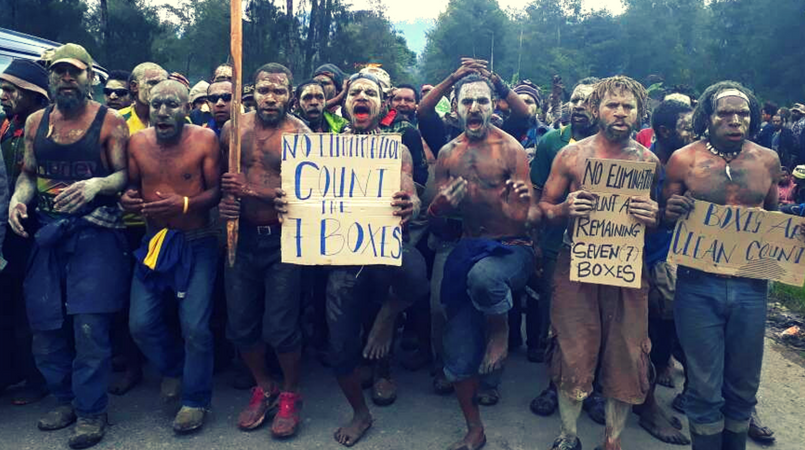
The national elections in the Highlands Region, in many cases, was not free, fair and just.
Journalist Freddy Mou witnessed firsthand the volatile situation of elections in the Highlands.
This is his summary of elections in the Highlands.
The campaign period in the Highlands region is always a time to showcase the sort of leaders a tribe has.
This is when pigs, cows and other livestock are slaughtered, with celebrations after celebrations held at various campaign venues by candidates to try and lure voters.
As described by bishops and Diocesan Secretaries of the four Highlands Dioceses in their Annual Regional Secretaries Meeting earlier this year, elections in the region have never been free, fair and transparent.
The people of the region have suffered and many have been routinely denied services.
Only a minority have benefited while the common people struggle to make ends meet.
While elections in the Highlands is known for its fiesta, mandating a leader always involved violence and corrupt dealings, requiring more security.
Security personnel engaged for the elections were mainly focused on the Highlands.
Police Commissioner Gari Baki, in a meeting with government departmental heads before the campaign period, said there were still issues in the Highlands which needed close attention.
He cautioned that for the past five years, provinces such as Southern Highlands witnessed peace but this did not mean there would be no threats or disruptions during the election period.
As reported, no election related violence occurred during the campaign period but a large sum of cash was involved.
Heading into and during polling, a lot of issues were raised by concerned candidates and supporters.
These involved the electoral roll update, polling venues and others.
Bulk voting and underage voting was also witnessed in some parts of the Highlands region.
Even though security personnel were present at the polling venues, nothing was done to stop such practices.
A candidate in the Goroka Open seat posted pictures on social media alleging that people were voting at will, without any control from the polling officials.
However, Provincial Election Manager Steven Kaupa brushed aside the allegations.
Kaupa, when asked about the claims, said the presiding officer, at that time, allowed that to happen in order to complete polling on time.
Furthermore, the rugged terrain of some remote areas in the Highlands region is always a challenge to the Electoral Commission when conducting polling.
Most of the provinces in the region did not complete polling on time as scheduled because of such.
An issue that grabbed the public’s attention is now before the court: Sunday polling.
Prime Minister Peter O’Neill’s Ialibu-Pangia electorate was one of the areas implicated in this.
However, Ialibu-Pangia Returning Officer Michael Ariando explained that due to time constraints, he had to allow for Sunday polling with the advice from Election Manager David Wakias and Electoral Commissioner Patilias Gamato.
Counting was also one of the scrutinised areas where candidates and scrutineers were on alert.
Rumours of election officials allegedly being bribed during counting was the ‘talk of the day’.
However, despite criticisms, Tari-Pori electorate in Hela Province was the first to declare its MP.
Returning Officer for Tari, Jack Walara, declared James Marape at 11:30am on July 9 in Tari, Hela Province.
Walara confirmed that Marape reached the absolute majority of 50% + 1, collecting 30,192 votes.
One of the counting venues that had raised its standards, in terms of security, was the counting venue for Eastern Highlands Province. The area was fitted with surveillance cameras all around the centre.
Declarations have been made on time for most Highlands provinces but only a few that were marred with election-related violence were prolonged. These provinces include; Kandep Open in Enga, Kundiawa in Simbu, Eastern Highlands regional, Southern Highlands regional and Simbu provincial.
Wabag town in Enga Province turned into a battlefield one Saturday morning on July 22, when supporters of two candidates confronted each other with high-powered guns. This followed the attempted murder of Kandep district returning officer Ben Besawe and other officials.
Eyewitnesses and security personnel said Besawe and two other election officials were shot at in front of a guest house at Wabag town.
This occurred while they were preparing to make their way to the counting venue at Wabag Primary School.
The incident led to a clash between supporters of two candidates from Kandep, who have been at loggerheads over election-related matters.
In Kundiawa, Simbu Province, three people are dead and several others hospitalised after a riot broke out in the counting centre. The incident occurred at around 7am on Sunday, July 30, 2017.
It was alleged that supporters of incumbent MP Tobias Kulang tried to enter the counting centre when they were stopped by members of the public, which then led to a big fight.
Many election related incidents have occurred in other areas but have remained unreported.
Now that all declarations have been made, except for Southern Highlands regional, and MPs elect have signed the declaration of loyalty to serve the people and the Independent State of PNG, election petitions will most likely increase to challenge the victory of the elected leaders.
(Loop file pic of protest in Enga)
